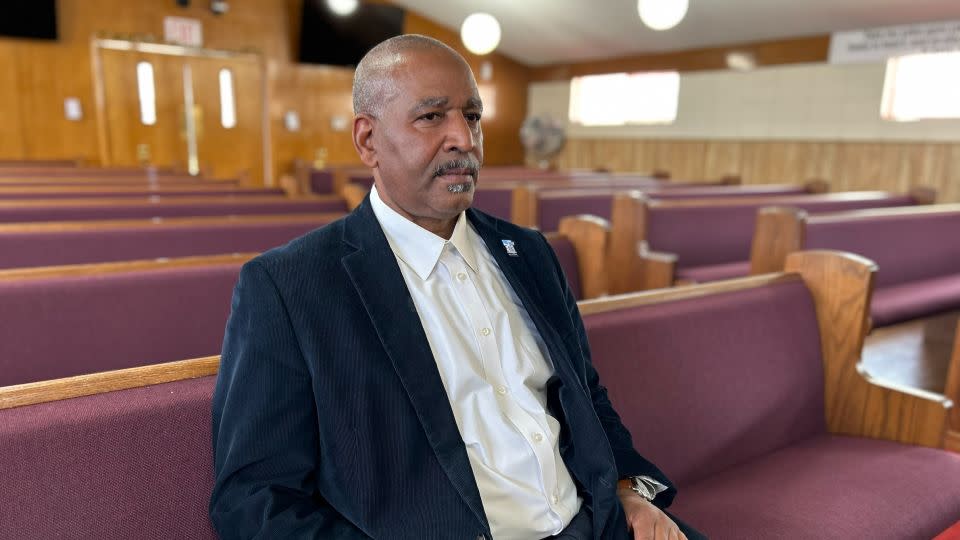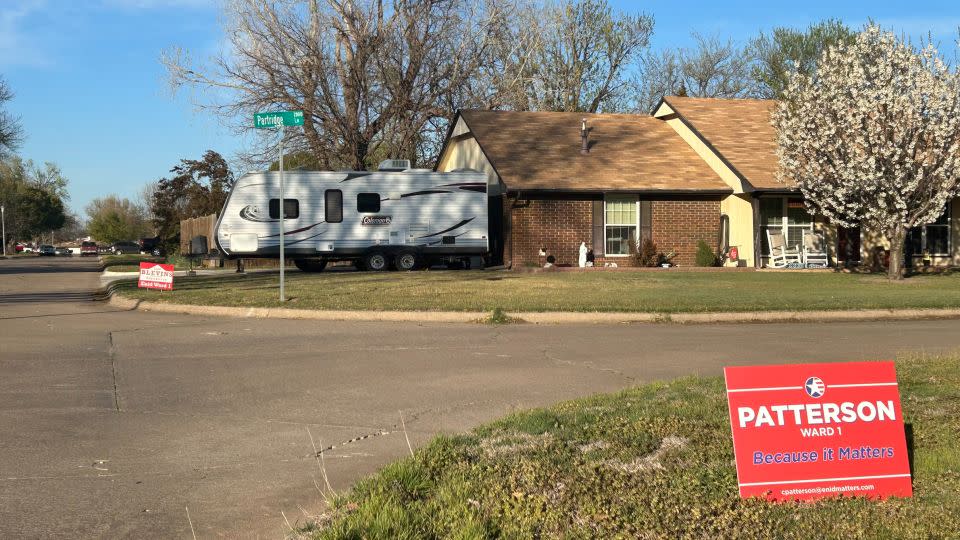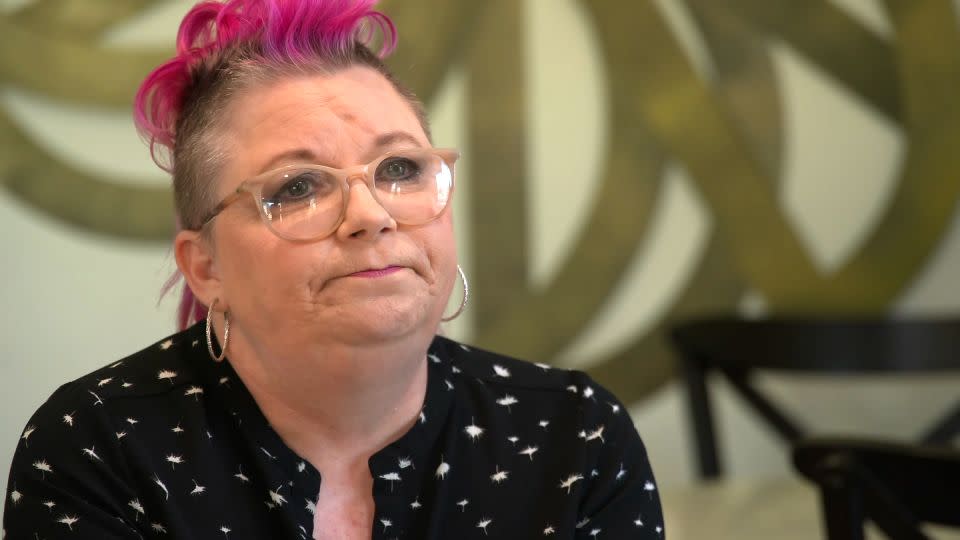A man who attended the Charlottesville Unite the Right rallies will lose his city council seat after his past was revealed
When a public official in a small Oklahoma city faced a censure vote that condemned his recent ties to White nationalism, he was saved – at least temporarily – by a Black man.
Several residents in Enid blasted city council commissioner Judd Blevins at a public meeting last fall for participating in the 2017 “Unite the Right” rallies in Charlottesville, Virginia, that saw one counter protester killed and dozens injured. They also highlighted offensive comments he was accused of making online under a pseudonym.
Others defended Blevins, saying he had a right to free speech and rejected the censure effort as a political ploy fueled by Enid’s small progressive enclave.
But Derwin Norwood, the only Black commissioner on the city council, made an impassioned plea at the end of the meeting, scolding the community for fighting rather than forgiving. Norwood, who sits next to Blevins at the council meetings, then asked him to stand up, told him he loved him and gave him a hug.
Half the room erupted into cheers and applause. The other half sat in silence – or clapped politely.
“I realized that in forgiving him, I freed myself from becoming what he was or still may be,” Norwood told CNN in an interview last week. “I had to free myself.”
Moments later, the city council agreed to postpone the censure vote, a devastating blow to a local group of activists who’d been sounding the alarm about Blevins’ past.
But the group, the Enid Social Justice Committee, moved forward with its plan to collect enough signatures for a recall petition, eventually forcing a special election this week.
Voters on Tuesday decided to oust Blevins – who has denied being a White nationalist, but has also made confusing statements about his past – in favor of Cheryl Patterson, a different conservative, in a race that’s thrown the city into a deep ideological divide over questions of forgiveness, accountability and US history.

Blevins says he attended rally, denies White nationalism
Enid, located in northern Oklahoma, has a population of about 50,000 and votes overwhelmingly for Republicans. The city is known for its towering grain elevators and is home to Vance Air Force Base.
More than a month before Blevins was elected in February 2023, the local newspaper highlighted a 2019 report by Right Wing Watch, a left-leaning organization that monitors far-right extremism. The report identified Blevins as the Oklahoma recruiter for Identity Evropa, a group that has since disbanded and was described as a White supremacist organization by the Anti-Defamation League.
The article largely went unnoticed, and while two local Democrats tried to confront Blevins about the issue at a candidate event shortly before the election, Blevins still won the race for Ward 1 by 36 votes. A total of 808 votes were cast.
When Blevins took office in May, the small Enid Social Justice Committee developed a more vocal campaign to bring attention to his recent history, holding protests and speaking up at city council meetings. Kristi Balden, chair of the group, said she was horrified when she learned of Blevins’ connections to White nationalist activity.
“It was very, very disturbing and frightening,” she said. “I thought, ‘How is this still happening in this year?’”
Blevins acknowledges he attended the Charlottesville rallies, and he was spotted in multiple videos and photographs. At a candidate forum last week, Blevins said he “felt it was important to protest the removal of statues of American soldiers.”
“It’s important to me,” he said. “It’s our history. It’s our heritage. It’s who we are.”
In 2019, the left-leaning group Unicorn Riot leaked thousands of messages from people involved in the Charlottesville rallies on the chat platform Discord. Among the threads was a user who went by the pseudonym “Conway – OK.” Right Wing Watch later identified the writer as Blevins.
Blevins has publicly implied he was behind the online messages and disavowed them at a city council meeting, but last month at a candidate forum, he also denied using the pseudonym.
Blevins has also denied that he’s ever identified as a White nationalist or White supremacist.
In one message less than a month before the 2017 rallies, Conway wrote positively about Adolf Hitler, saying, “Hitler never would have allowed this sh*t.” Conway also wrote a derogatory statement about a Jewish woman. The contexts of the posts are unclear.
And in one message less than two weeks before the Charlottesville rally, Conway wrote: “I JUST CANT FEEL SAFE IF IM NOT PACKING AN AR WITH A 100 ROUND DRUM AND SPORTING MY SWASTIKA ARMBAND.”

‘I am a different man today’
Blevins, who declined to speak to CNN for this story, vaguely responded to some unearthed moments from his past at a city council meeting on November 7. He cited the importance of First Amendment rights but did not directly address his alleged involvement with Identity Evropa.
“It is important for the American people to advocate for what they believe in,” he said, adding, “If we find ourselves having to make apologies when we exercise these rights, then we don’t have them.”
“I am a different man today than I was yesterday,” he continued. “There is no hate in my heart. All there is is the desire to follow the Lord. But I’m not going to apologize for things I never was.”
Members of Enid Social Justice Committee jeered at his remarks, resulting in a shouting match between one of its members, the mayor, and Blevins. The social justice committee member was ultimately kicked out of the meeting.
Balden said she didn’t believe Blevins’ comments at that meeting were genuine.
“If he really felt that way, he would denounce those organizations by name. If he really felt that way, he would apologize for his involvement in all those activities,” she said.
Blevins’ comments were also not enough to satisfy the city’s conservative mayor and others on the council. Two weeks later, they put the censure resolution on the agenda, saying Blevins’ “failure to explain and apologize” for his participation in Charlottesville “has continued to fester and has caused disruption and discontent among the residents of Enid.”
After another round of fiery public comment at a city meeting on November 21, Blevins again held his ground on speaking freely about one’s values and convictions, but took a slightly more contrite posture, saying he opposed all forms of racial hatred and discrimination.
“All of us have said foolish things in our lives. We’ve said things that we regret, and we have especially said things through the phone that when taken out of context can make you look like a terrible person. I’ve had some of the worst moments of my life put on blast to the world,” he added. “And if I’ve offended anyone in here, then I ask to be forgiven.”
Moments later, Norwood offered that public forgiveness in what became a pivotal moment in the overall debate over Blevins’ past.
Balden described Norwood as a “good” and “forgiving” man but said his embrace of Blevins gave more momentum to the city council member and his supporters.

“I understood why Derwin (Norwood) did that on a personal level,” she said. “It was very frustrating for us, because it felt like it sort of changed the way of what was going on.”
For his part, Norwood, a self-identified moderate Republican, has no regrets. “I felt convicted,” he said. “Up until that moment, I struggled with it, but I forgave him.”
Blevins was also asked extensively about his past by moderators at a candidate forum last week, where he, at times, remained defiant about his personal views.
“I am opposed to all forms of racial hate and racial discrimination,” he said. “But I’m not going to play this game where I take things that the media says are problems from America’s past that are no longer problems today and pretend like they’re serious issues. They’re not.”
Asked specifically about his ties to Identity Evropa, Blevins argued his role as a city council commissioner is not relevant to an organization that has disbanded.
“Now, if speaking out against what was being done to this country, what is continuing… to being done to this country is a crime, then I would gladly plead guilty to that,” he continued, saying he has tried to “push back on this anti-White hatred that is so common in media and entertainment.”
‘A wound with a Band-Aid being ripped off’
In the week leading up to Tuesday’s vote, Blevins’ critics went door-to-door in his district, pointing voters to his history and asking them to vote for Patterson, a longtime conservative.
Norwood, speaking to CNN months after his public embrace of Blevins and just ahead of Tuesday’s vote, was also in the audience at the candidate forum last week and felt Blevins didn’t do himself any favors.
He said the election was in the hands of the voters, and he’s tried not to weigh in with his opinions too much.
“If Ms. Cheryl Patterson wins it, I believe there’d be a healing process,” he said earlier. “But if Blevins stays on the council and Ward 1 votes him in, it’s going to be like a wound with a Band-Aid being ripped off.”
For more CNN news and newsletters create an account at CNN.com

